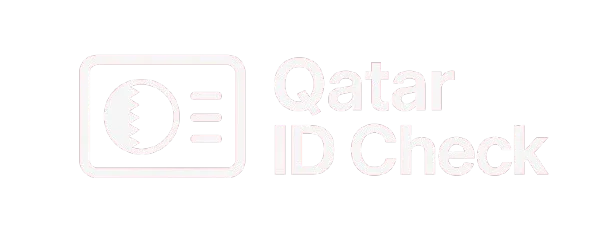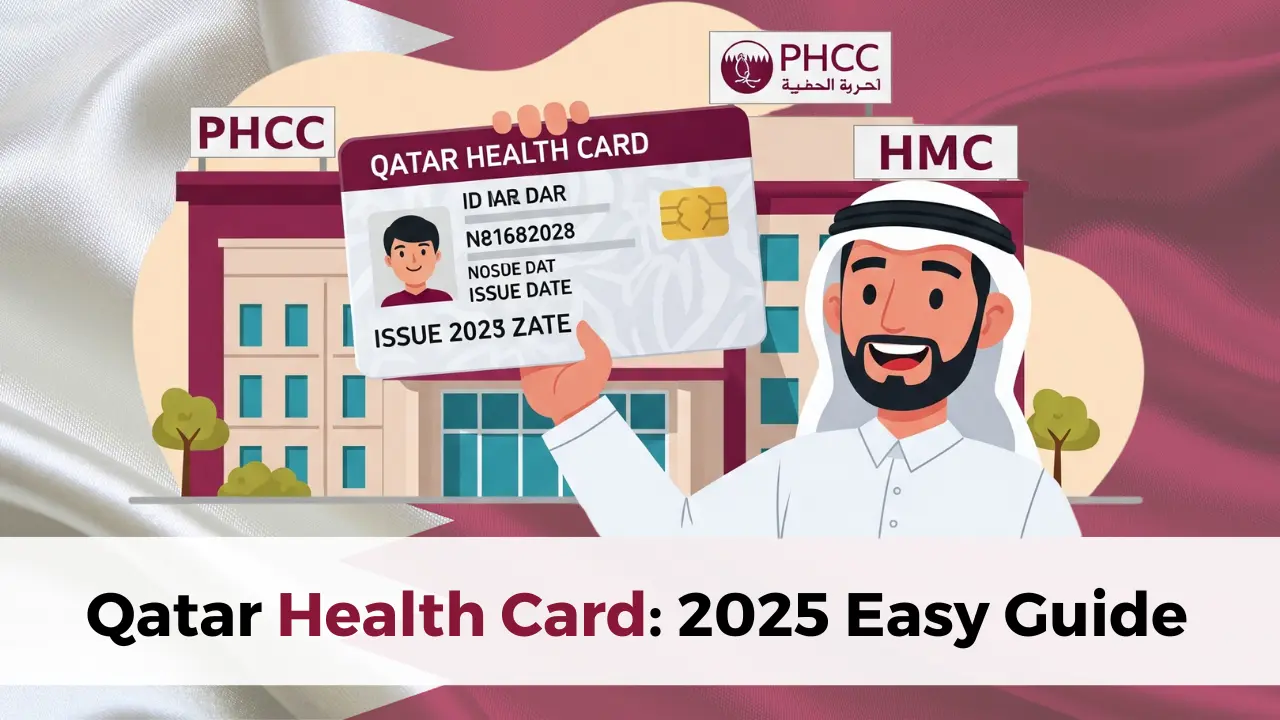Qatar Health Card: How to Apply, Benefits, and Renewal 2026
A Qatar health card gives you access to public healthcare services, including hospitals and clinics, at affordable rates. This card is available to both citizens and residents in Qatar, making it a vital item for those living or working in the country. By having a health card, you can receive medical treatment and medicines at subsidised costs.
If you are new to Qatar or planning to stay long-term, understanding how to apply for your health card and the benefits it provides will help you access quality healthcare when you need it. Getting this card is a straightforward process, and it ensures you can use key public health facilities easily.
What Is the Qatar Health Card?
The Qatar Health Card is a plastic card, similar in size to a driving licence, that allows you to access public healthcare services in Qatar. It comes with your ID number, photo, nationality, and issue date, and is used throughout government hospitals and clinics.
Purpose and Benefits
Your Qatar Health Card gives you access to medical services at reduced rates at government health facilities. You can visit clinics, hospitals, and pharmacies operated by the Hamad Medical Corporation (HMC) and the Primary Health Care Corporation (PHCC).
The card helps make routine doctor visits, emergency care, and prescription medicine more affordable. If you need referrals or ongoing care, your health record will be easier to access across different government healthcare providers.
A valid health card is essential if you plan to use government healthcare services as a resident or citizen. Without it, you may have to pay much higher fees or risk delays in receiving treatment.
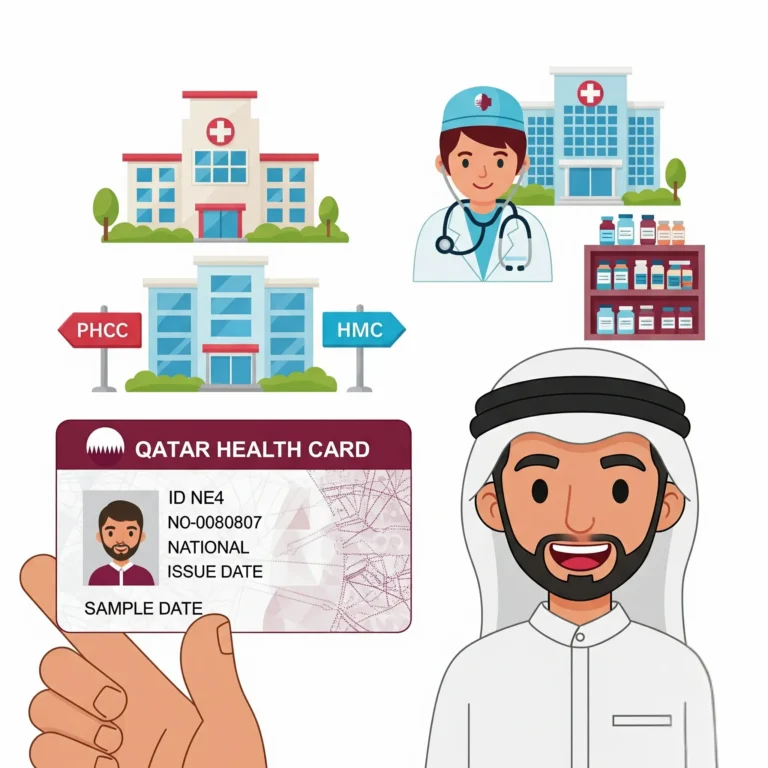
Who Issues the Health Card?
The Qatar Health Card is issued by the Qatar health sector, mainly through the PHCC and HMC. PHCC operates health centres where you register and apply for the card in person. These health centres are located throughout Qatar, making it easy for you to find one nearby.
HMC manages the main hospitals in Qatar and also accepts the health card for all covered medical services. Both organisations work together to keep your records secure and up to date.
Once you apply with all necessary documents, the health card can be issued usually within 24 hours. It is available to all citizens and legal residents, regardless of age or nationality.
Eligibility Criteria for Qatar Health Card
Anyone living in Qatar including citizens, residents, and certain groups of workers, can apply for a health card. Specific requirements differ based on your status, nationality, and relationship to the main applicant.
Residents of Qatar
If you are a resident of Qatar, you must have a valid Qatar ID (QID) to apply for a health card. This includes expatriates, long-term residents, and workers under sponsorship. You must present your QID, a recent passport-sized photograph (typically 4 cm x 3 cm), and pay the fee set by the authorities.
Make sure your documents are current and match the information in your application. The card allows you to access health services at government clinics and hospitals. Both single residents and families can apply at their local Primary Health Care Centre (PHCC), either online or in person.
Students, domestic workers, and sponsored employees are also eligible if they have the required documents. Proof of residence, like a tenancy contract or utility bill, may sometimes be requested. You must also be living in Qatar at the time of application.
Qatari Nationals and GCC Citizens
Qatari nationals can apply using their Qatar ID. Adult Qatari nationals should bring their QID, a coloured photograph, and pay the relevant fee, which is often lower than for expatriates. Child nationals need their birth certificate, QID (if applicable), and a photograph.
GCC citizens living in Qatar are also eligible for a health card, provided they hold a valid GCC passport and proof of residence. The process is similar to that for Qatari nationals, but some documents, like a residency permit or supporting letter from an employer, may be needed.
If you are a GCC national residing in Qatar for work, study, or with family, you must show documentation proving your status. GCC nationals visiting as tourists are not automatically eligible unless they hold valid residence permits.
For Dependents and Employees
You can include your dependents, such as your spouse, children, or sponsored family members, on your health card application. For each dependent, submit copies of their QID or passport, passport sized photograph, and any supporting documents showing your relationship.
For employees, especially domestic workers or sponsored staff, the employer or sponsor must often submit the application. You need to supply the worker’s valid residency documents and photographs. Some employers may be required to provide a letter confirming employment and sponsorship.
Children, including infants born in Qatar, are eligible if they have their own QID or a birth certificate. Employees who live with their sponsors are usually included in the sponsor’s household application. Be sure to check the latest rules from PHCC or Hukoomi, as needed documents may change.
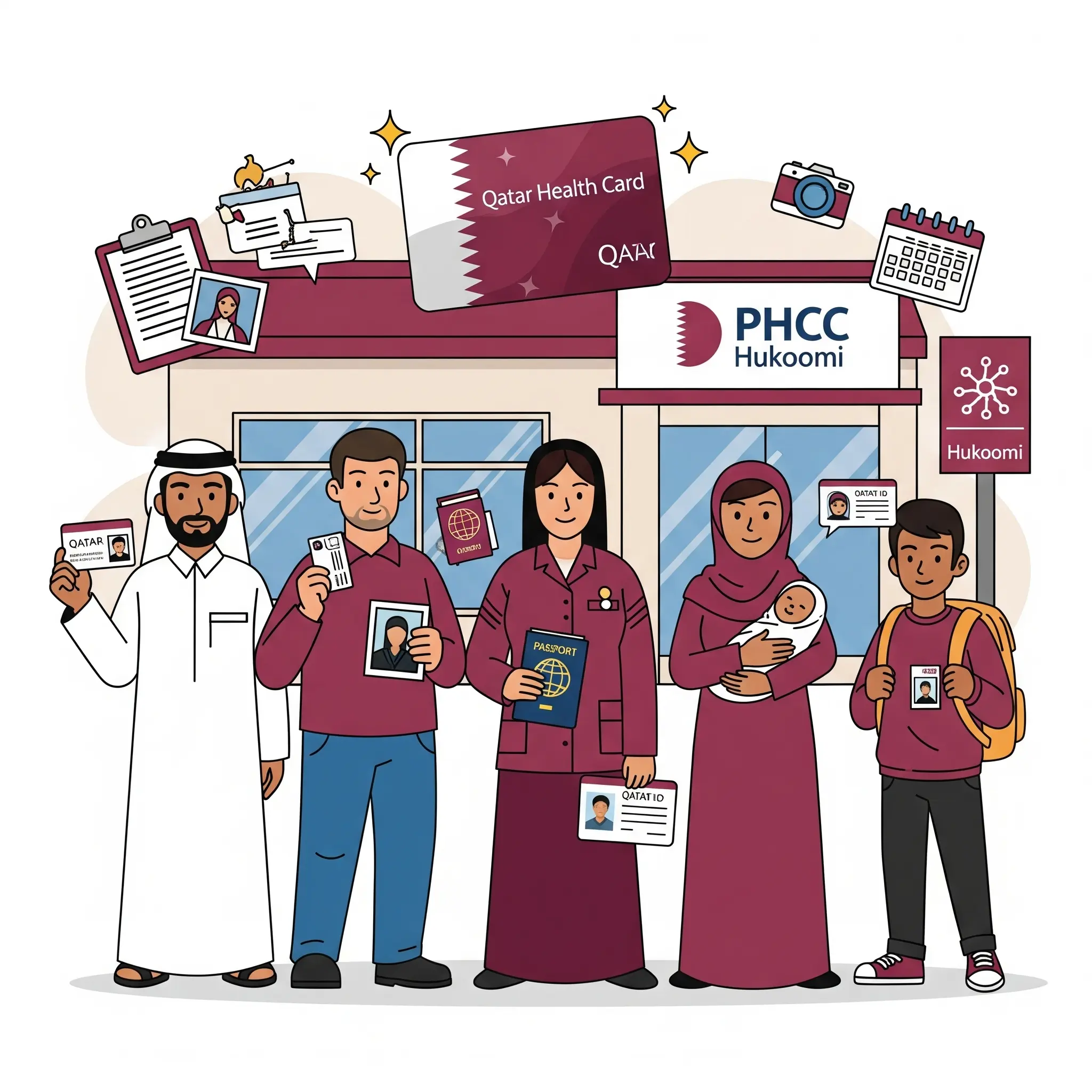
Documents Required for Application
To apply for a Qatar Health Card, you need to provide specific documents that confirm your identity, your residence status, and your relationship to any dependents. Ensuring you have the correct paperwork helps the process go smoothly and avoids delays.
Proof of Residence
You must show proof that you live in Qatar. This is most often a recent utility bill, such as a KAHRAMAA water or electricity bill, that lists your address.
Your name or the main renter’s name should match the one on your Qatar ID. If you do not have a utility bill, a rental contract is sometimes accepted, provided it includes your name and current address.
Some health centres might also ask for a Qatar residence permit copy, so have it on hand just in case. Double-check which documents are accepted at your nearest Primary Health Care Centre (PHCC) before you visit.
Valid Qatar ID and QID Number
A valid Qatar ID (QID) card is required for all applicants. This card proves your identity and legal residency in Qatar. Check the MOI Qatar ID status before applying for the Health Card.
When you apply, provide both the original Qatar ID and a clear photocopy. The QID number included on the card is key, as it links your personal records to government healthcare databases.
Make sure your QID has not expired. If your identification card is close to expiring or recently renewed, bring any supporting receipts or papers just in case staff ask to see them. For online applications, a scanned copy of your Qatar ID is usually uploaded through the system.
Supporting Documentation for Dependents
If you are applying for health cards for family members or dependents, you need to include documents that show your relationship. For children, you should provide a copy of their birth certificate, along with copies of their Qatar ID cards (if they have one).
For a spouse, a copy of your marriage certificate or the family relationship page from your dependent’s QID may be requested. You also need to submit proof of residence that covers all listed family members.
Some centres may ask for passports or recent photographs for each dependent. Be sure to check the latest requirements, as they may change depending on the applicant’s age or residency type.
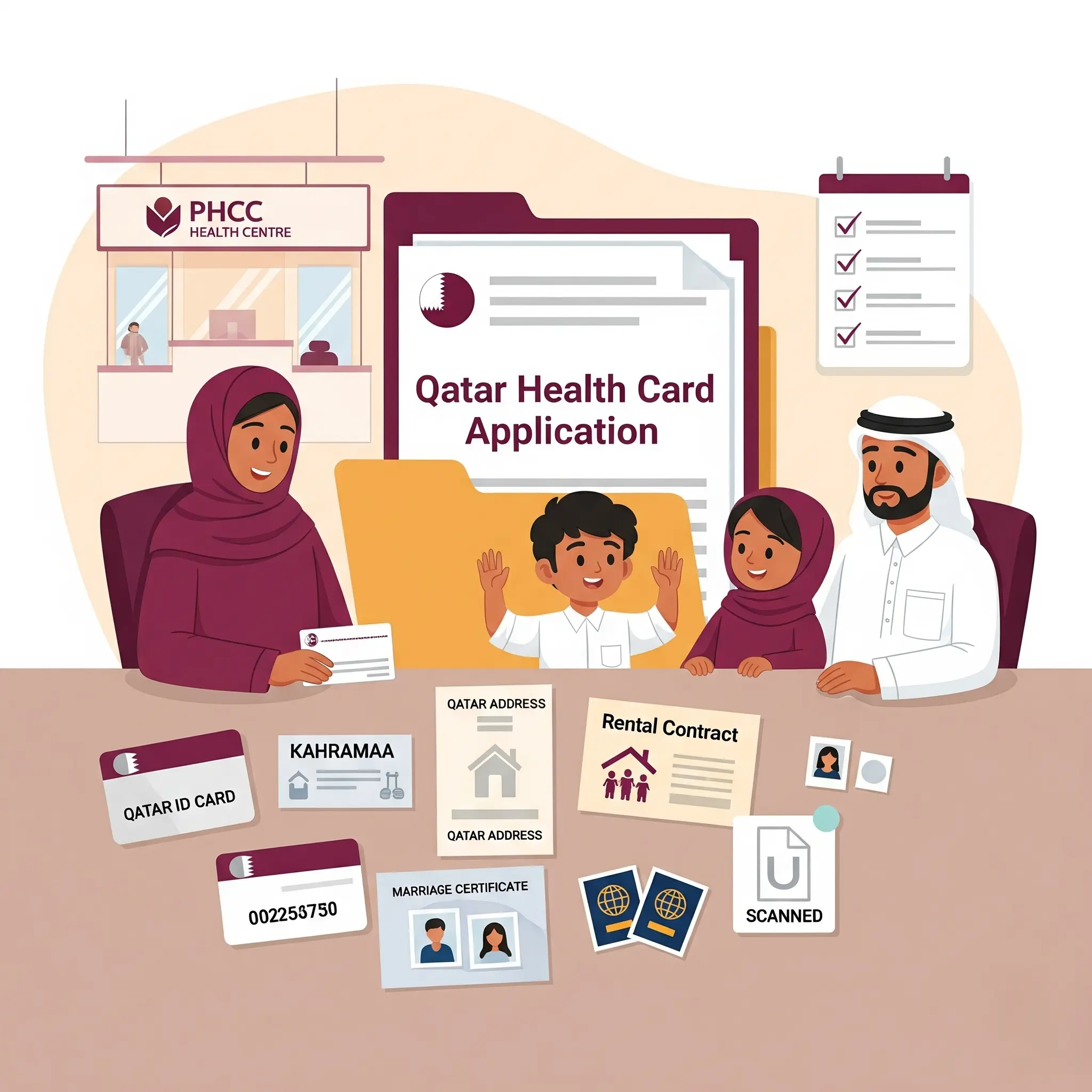
How to Apply for a Qatar Health Card
You can apply for a Qatar Health Card either online or by visiting a Primary Health Care Corporation (PHCC) health centre. Both methods require you to fill out an application form, provide supporting documents, and pay a fee.
Online Application Process
You can apply for your Health Card online through the Hukoomi Qatar government portal. Start by visiting the official Hukoomi website. Look for the “register for new health card” service.
To begin, you need a valid Qatar ID, passport-sized photograph, and contact information. The application form will ask for personal and contact details. Upload a clear copy of your ID and a passport photo as part of the health card application process.
After entering your details, you can pay the required fee by credit or debit card. Once you finish, your health card is usually processed quickly. Some applicants get their card within 24 hours. You may receive a notification when it is ready for collection.
At PHCC Health Centres
If you prefer, you can apply at your designated PHCC health centre. You need to bring your Qatar ID, passport photo, and proof of address, such as a utility bill.
At the health centre, ask for an application form from the registration desk. Fill in the form and attach your documents. Submit all required documents and pay the application fee at the cashier’s office.
Staff will process your paperwork on the spot. In most cases, your Qatar Health Card is issued the same day. Ask the staff for details on collection times if you need to return later. This process is useful if you have questions or need help with your application.
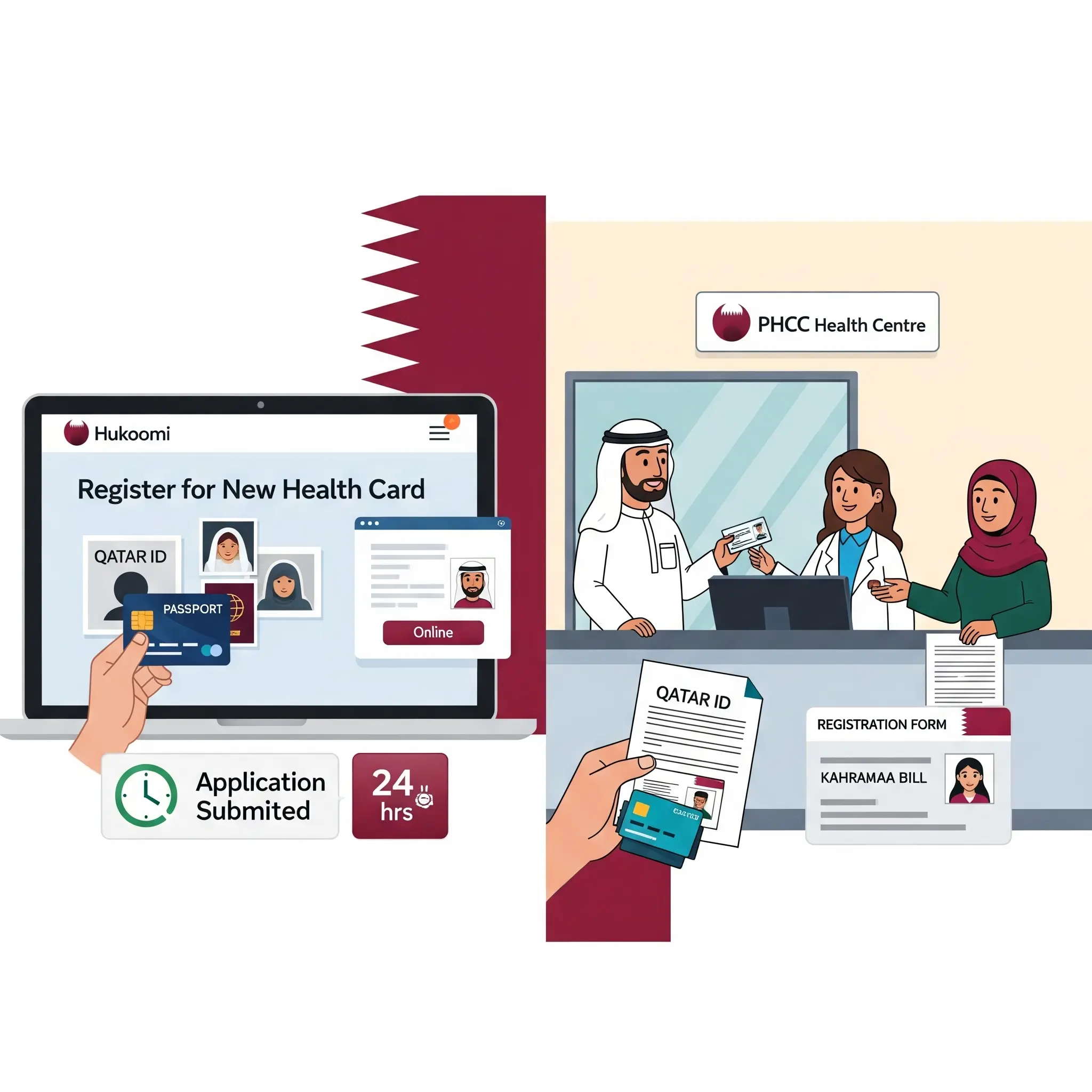
Fees and Payment Methods
Costs for the Qatar Health Card can vary depending on your residency status and role. You will need to pay the set renewal or application fee using approved payment methods at the time of application or renewal.
Fee Structure for Different Applicants
- The standard health card fee is QR 100 for expatriates.
- If you are a domestic worker (such as a maid or driver), the fee is reduced to QR 50.
- Qatari citizens receive the card free of charge.
Children who are residents may be required to pay similar fees to adults, except in special cases where additional documents may be needed.
You will find that these subsidised rates help ensure affordable access to state healthcare services for all residents. The fee covers both initial issuance and annual renewal of the health card.
In cases where your card is lost or damaged, you may also need to pay a replacement fee at a similar rate to the renewal cost.
Accepted Payment Methods
- You can pay fees using a credit or debit card at most PHCC centres and Hamad Medical Corporation hospitals.
- Cash payments are sometimes accepted at certain centres, but electronic payments are more widely encouraged.
- When renewing online, payment by credit or debit card is required via the official Ministry portal or the Nar’aakom app.
- Always bring your card(s) with you when visiting in person, as payments at the counter are usually by card.
Receipts are issued after payment, and you will need to show proof if there are any questions about fee processing.
If you are applying at a government office or PHCC, be aware that only major card brands are typically accepted.
Using the Qatar Health Card
With your Qatar Health Card, you can receive a range of healthcare services at public facilities across the country. The card makes it easier to get affordable treatment and register with a family physician at a local health centre.
Access to Public Healthcare Services
Your Qatar Health Card gives you access to government hospitals and health centres managed by the Primary Health Care Corporation (PHCC) and Hamad Medical Corporation (HMC). With the card, you can receive consultations, non-emergency treatments, and other basic services at subsidised rates.
When you visit a public healthcare facility, present your card at reception. The staff will verify your details and guide you through the registration process. You do not need to book far in advance for most general services, but it is best to check with your local centre.
If you need specialist care, the doctor at your health centre can refer you to a hospital. The card also lets you access laboratory tests, pharmacy services, and follow-up appointments at reduced fees.
| Service | Health Card | Without Health Card |
|---|---|---|
| Consultation Fee: | Subsidised | Full Price |
| Pharmacy: | Subsidised | Full Price |
| Laboratory Tests: | Subsidised | Full Price |
Registering with a Family Physician
To get consistent care, you will need to register with a family physician at your local PHCC health centre. This doctor will be your first point of contact for most health issues and can coordinate your ongoing care.
Once you receive your health card, visit the health centre near your home. Bring your card and any other identification required. The staff will help assign you a family doctor. Registration is quick, and you can start booking appointments right away.
Your family physician provides regular check-ups, manages chronic illnesses, and refers you to specialists if needed. This approach helps keep your medical history in one place and ensures you get the right care.
If you wish to change your family physician or health centre in the future, you can request a transfer. This allows flexibility and keeps your care personal and accessible.
Qatar Health Card Renewal Process
Renewing or replacing your Qatar Health Card ensures you continue to have access to healthcare services in the country. The process is straightforward, whether your card has expired been lost or damaged.
Qatar Health Card Renewal Procedure
You can renew your Qatar Health Card online, in person at a health centre, or at Hamad Medical Corporation (HMC) hospitals. The most convenient way is through the Hukoomi e-service portal.
To renew online:
- Go to the Hukoomi website.
- Enter your QID number and health file number.
- Follow the prompts, pay the renewal fee, and submit your request.
Renewal fees vary:
- Qatari nationals: QR50
- Non-Qataris: QR100
You will receive your new card by post or you may be notified to collect it at a centre. Always check that your personal details are up to date to avoid delays. Renewal can be done at any time before the card’s expiry to prevent lapses in coverage.
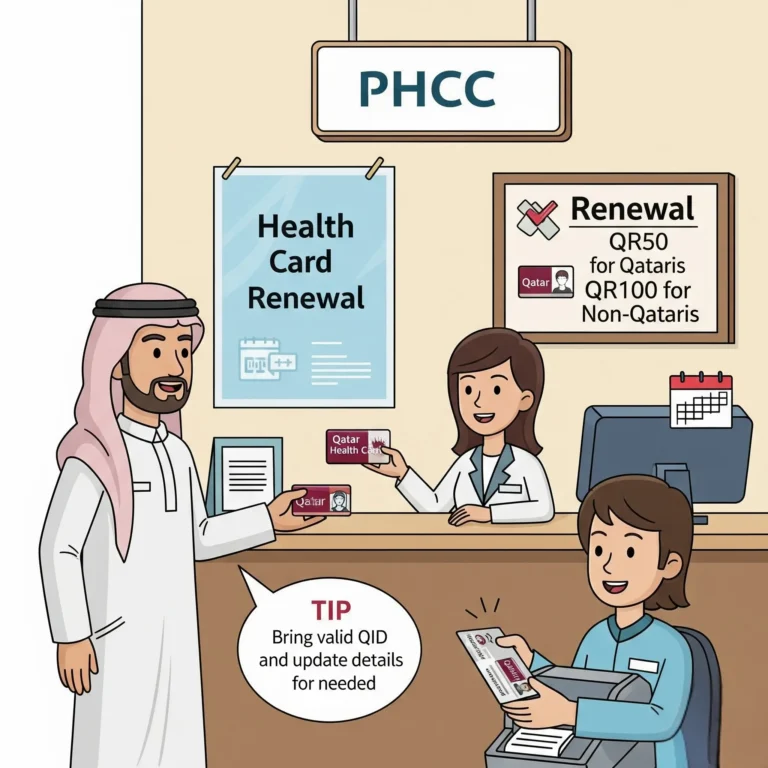
Lost or Damaged Health Card
If your health card is lost or damaged, you need to apply for a replacement. This can also be done online using the Hukoomi portal or by visiting a local health centre.
Replacement fees depend on your status and card condition:
| Status | Valid Card | Expired Card |
|---|---|---|
| Qatari nationals: | QAR 50 | QAR 100 |
| Non-Qataris: | QAR 100 | QAR 200 |
When applying for a replacement, provide your QID and your health file number. You may need to present your original ID and, if collecting in person, a passport-sized photo. Reporting the loss as soon as possible helps protect your healthcare benefits and personal information.
Using Digital Services for Health Card Management
You can now manage many health card services online in Qatar. This includes applying for, renewing, and updating your health card details without visiting health centres in person.
National Authentication System
The National Authentication System (NAS) is a secure online platform that helps you access government services, including those for your health card. To use online health card services, you need to log in with your NAS account.
This system uses your QID (Qatar ID) and password or Qatar-eID. It protects your personal data and keeps all transactions safe. Once you are logged in, you can access applications, renewals, and updates for your health card directly through government websites like Hukoomi.
Steps to use NAS for health card management:
- Visit the official Hukoomi portal.
- Select the health card service you need.
- Log in using your NAS account.
- Complete the necessary forms and submit your application or renewal.
Using NAS helps to avoid delays and mistakes because your information is auto-filled using your existing records.
Nar’aakom Mobile Application
The Nar’aakom mobile application is provided by the Primary Health Care Corporation (PHCC). It allows you to manage health card services directly from your smartphone. You can download the app from your device’s app store.
With Nar’aakom, you can:
- Apply for a new health card
- Renew your existing health card
- Manage your dependents’ health cards
- Book and manage PHCC appointments
The app is simple to use. After signing in, you follow the on-screen steps to complete your task. You receive notifications about your health card status, and you can view your digital health card anytime. This removes the need to visit a service centre for most requests and saves you time.
Special Cases and Additional Information
Some situations when applying for or renewing a Qatar health card require extra steps or specific documents. Requirements for domestic staff, as well as information about inoculation cards, are important for many applicants.
Domestic Staff Applications
If you employ domestic staff, there are specific rules for applying for their health cards. Their application must be submitted by the sponsor, usually the employer. You need to bring the domestic worker’s Qatari ID or passport, a passport-sized photo, and a copy of your own Qatari ID as evidence of sponsorship.
You may also be asked to provide the employee’s residency permit and a letter confirming their employment. If your domestic worker is new to Qatar, a copy of their entry visa might be needed. It is important to ensure all documents are current and valid. Payment for the health card is often required at the time of application.
Renewal for domestic staff follows a similar process. Make sure you renew before the card expires. It’s a good idea to check exact requirements with your local health centre, as rules can sometimes change without notice.
Inoculation Card and Other Related Documents
An inoculation card (vaccination record) is sometimes asked for, especially for children or anyone applying for a health card for the first time. The inoculation card shows which vaccines you or your dependents have received, such as those required for residency or school entry.
If you are applying for dependents or children, bring their inoculation card with you. This can help speed up the processing of the health card and make sure your child’s immunisations are up to date.
Other related documents might include previous health cards (for renewals), residency permits, and recent photographs. Keeping these documents organised will make your visit to the health centre smoother and help avoid delays.
Common Issues and Solutions
Applying for or updating your Qatar Health Card often involves common problems. Knowing how to handle these makes the process quicker and prevents future complications.
Application Rejection
Application rejection is a frequent issue, usually caused by missing documents, incomplete forms, or incorrect details. Make sure your QID number, photographs, and copies of residency permits are accurate and legible.
If your application is rejected, review the rejection notice. It often lists the reason, such as invalid documents or incorrect personal details. Gathering the correct paperwork and reapplying usually solves the problem.
Sometimes, applications are rejected if your residence permit has expired or your information does not match official records. Always double-check your documents before submission. For persistent issues, you may visit your nearest PHCC or HMC branch or contact their support team for further help.
Updating Personal Details
Keeping your personal information up to date on your health card is important. Mismatches can result in the denial of services or trouble using your card at clinics and hospitals.
To update your details, such as name, address, or contact number, visit the health services portal online or go directly to a PHCC centre. Bring your current health card, QID, and any supporting papers that prove the change, such as an official letter or updated ID.
Check all the information carefully before submitting your request. If the update involves a legal name change, you may be asked for a court order or legal document. Always confirm with staff that the update has been processed correctly in the system to avoid problems later.
Frequently Asked Questions (FAQs)
Conclusion
The Qatar Health Card is a must-have for anyone using public healthcare in Qatar. It helps you get medical care at low cost across PHCC and HMC clinics and hospitals.
Applying is easy, whether you choose the online or in-person method. Make sure your Qatar ID and documents are valid before applying.
Keep your health card up to date to avoid service delays. It is your key to affordable healthcare in Qatar.
